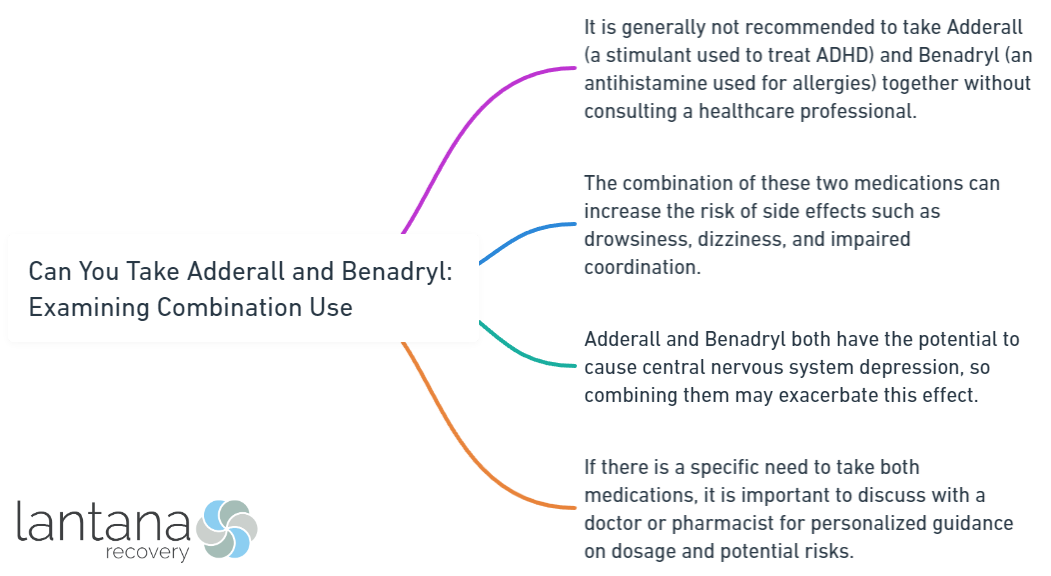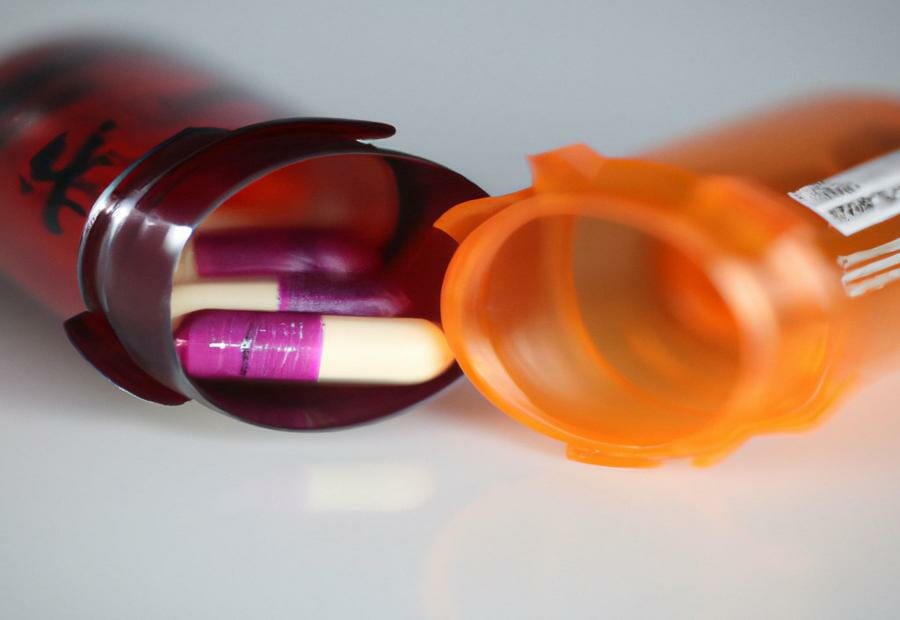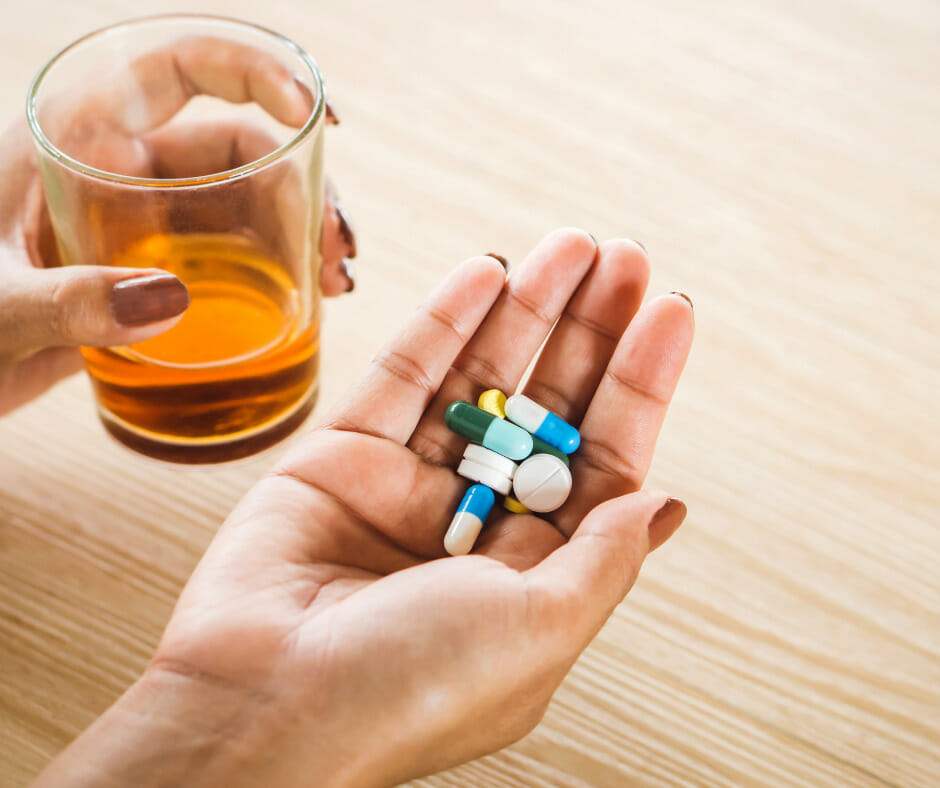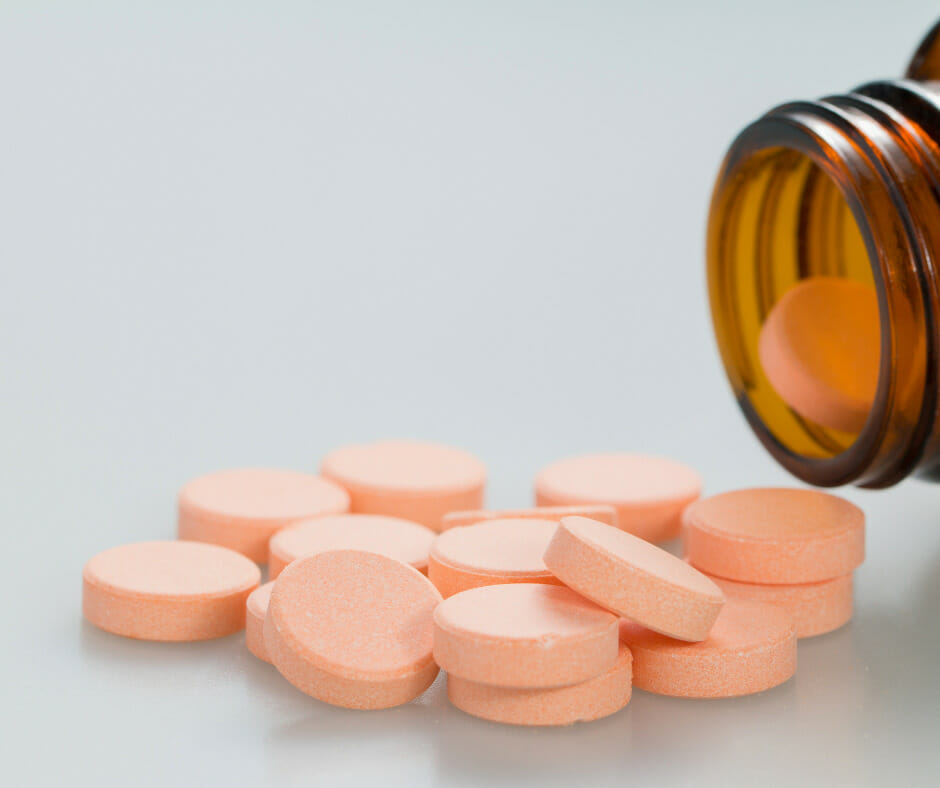Adderall and Benadryl are both commonly used medications, but can they be taken together? Examining the combination of Adderall and Benadryl is essential to understand any potential risks and interactions. It is crucial to have accurate information about these medications before considering their combined use.
Adderall is a prescription medication that contains a combination of amphetamine salts and is primarily used to treat attention deficit hyperactivity disorder (ADHD). On the other hand, Benadryl, also known as diphenhydramine, is an over-the-counter antihistamine commonly used to relieve allergy symptoms.
Interactions between Adderall and Benadryl can occur, as both medications can affect the central nervous system. It is important to know how Adderall and Benadryl interact in the body and whether they can decrease each other’s effectiveness. combining these medications may increase the risk of certain side effects.
However, there are situations where the combination of Adderall and Benadryl might be used under medical supervision. It is essential to explore alternative treatments and medications for ADHD symptoms and allergic reactions to understand the options available.
By examining the combination use of Adderall and Benadryl, individuals can make informed decisions about their healthcare and discuss any concerns with healthcare professionals. Understanding the potential risks and alternatives is crucial for safe medication management and overall well-being.

What Is Adderall and Benadryl?
Adderall and Benadryl are medications with different purposes and effects on the body. Adderall is a prescription medication that treats attention deficit hyperactivity disorder (ADHD) and narcolepsy. It increases certain brain chemicals responsible for attention and impulse control, improving focus, reducing hyperactivity, and managing ADHD symptoms.
In contrast, Benadryl is an over-the-counter antihistamine used to relieve allergy symptoms like sneezing, itching, watery eyes, and runny nose. It works by blocking the effects of histamine, a substance that triggers allergic reactions.
It’s important to note that these medications have distinct mechanisms of action and should not be used interchangeably. Adderall is a stimulant, while Benadryl is an antihistamine. They have different intended uses and effects on the body.
If you have any concerns or questions about taking these medications together or their individual use, consult a healthcare professional. They can provide personalized advice based on your specific situation and medical history.
Can You Take Adderall and Benadryl Together?
Taking Adderall and Benadryl together can have adverse effects on the central nervous system. The active ingredients in both medications can cause drowsiness and may increase sedative effects when combined. This combination also poses a potential risk of increased heart rate and blood pressure. Adderall is a stimulant that can elevate heart rate and blood pressure, as reports a study conducted by the experts at Howard University Hospital, Washington. When combined with Benadryl, known for lowering blood pressure, it can cause irregular heartbeats and unpredictable cardiovascular effects..
Before taking both medications together, consult with a healthcare professional. This is especially important if you have pre-existing medical conditions or are currently taking other medications. A healthcare professional can provide personalized advice based on your specific situation.
Consider the dosage of each medication. Higher doses or prolonged use can increase the chances of experiencing side effects. The appropriate dosage and duration of use should be determined by a healthcare professional.
Monitor your body’s reaction if you decide to take Adderall and Benadryl together as individual responses to medication can vary.
Ultimately, the decision to take Adderall and Benadryl together should be made in consultation with a healthcare professional. They can provide guidance based on your specific circumstances.
What Are the Potential Risks of Combining Adderall and Benadryl?
The potential risks of combining Adderall and Benadryl include:
- Increased drowsiness: Adderall and Benadryl can cause drowsiness. When taken together, they can enhance sedative effects, leading to excessive drowsiness and impairing concentration and safe machinery operation.
- Cardiovascular effects: Adderall increases heart rate and blood pressure, while Benadryl can cause dizziness and low blood pressure. Combining these medications can potentially result in irregular heart rhythms or other cardiovascular issues.
- Central Nervous System (CNS) depression: Both Adderall and Benadryl can depress the central nervous system. Taking them together can intensify this effect, resulting in slowed reflexes, confusion, and difficulty coordinating movements.
- Overdose risk: Combining Adderall and Benadryl increases the risk of overdose. Taking more than the recommended dose can lead to serious health consequences, including seizures, respiratory depression, or coma.
Note that these risks can vary from person to person. It is always advisable to consult with a healthcare professional before combining medications.
Pro-tip: To avoid the potential risks of combining Adderall and Benadryl, talk to your doctor or pharmacist about alternative options for managing ADHD symptoms or allergic reactions. They can provide guidance on choosing safe and effective medications for your specific needs.

Interactions Between Adderall and Benadryl
When Adderall and Benadryl are taken together, it is important to understand how these medications can affect each other and the potential risks involved.
- Increased drowsiness: Adderall and Benadryl can both cause drowsiness. Taking them together can intensify the sedating effects, leading to excessive sleepiness and impaired cognitive function.
- Cardiovascular effects: Adderall is a stimulant that increases heart rate and blood pressure. Benadryl can cause dizziness and low blood pressure. Taking these medications together may result in unpredictable cardiovascular effects. “The most commonly observed cardiovascular effects linked with ADHD stimulant medications include hypertension and tachycardia,” suggests a study evaluating the impact of prescription stimulants for ADHD. (Prescription stimulants in individuals with and without attention deficit hyperactivity disorder: misuse, cognitive impact, and adverse effects, Lakhan, Kirchgessner, 2012)
- Impaired focus and concentration: Adderall is prescribed for ADHD to improve focus and concentration. However, the sedating effects of Benadryl can counteract the positive effects of Adderall.
- Dual effects on serotonin: Adderall increases serotonin levels in the brain, while Benadryl inhibits serotonin reuptake. Taking both medications together can lead to excessive levels of serotonin, potentially causing serotonin syndrome.
To ensure your safety, consult with a healthcare professional before combining Adderall and Benadryl. Personalized advice based on your medical history and current medications will be provided. Always follow their instructions and never exceed the recommended dosage of either medication.
Pro-tip: Read and understand the labels and warnings of both medications before taking them together. Additionally, be aware of potential drug interactions and discuss them with your healthcare provider. Your health and well-being should always be the top priority.
How Do Adderall and Benadryl Interact in the Body?
Adderall and Benadryl interact in several ways in the body. Here are the key interactions to consider:
- Central Nervous System Stimulation: When taken together, Adderall, a stimulant medication for ADHD, enhances its stimulant effects. This can lead to increased alertness and energy levels.
- Sedation: On the other hand, Benadryl‘s sedating effects can counteract the stimulant effects of Adderall. Taking them together may result in drowsiness or sedation, which interferes with the desired effects of Adderall.
- Increased Heart Rate and Blood Pressure: Combining Adderall with Benadryl can potentially further elevate heart rate and blood pressure. This may be concerning for individuals with cardiovascular conditions.
- Risk of Overdose: Both Adderall and Benadryl can cause side effects and have the potential for overdose. Taking them together without medical supervision increases the risk of adverse effects or overdose.
Consulting with a healthcare professional before combining Adderall and Benadryl is essential. They can provide guidance considering individual factors such as medical history, current medications, and specific symptoms. Always follow the prescribed dosage and adhere to the healthcare professional’s advice for safe use.
If alternatives to the combination of Adderall and Benadryl are needed, individuals should discuss alternative medications for ADHD symptoms or alternative treatments for allergic reactions with their healthcare provider. The healthcare provider can recommend the most suitable options based on the individual’s specific needs and circumstances.
Can Adderall and Benadryl Affect Each Other’s Effectiveness?
Taking Adderall and Benadryl together can indeed affect each other’s effectiveness. It is essential to consider several key factors before combining these medications.
- Timing is crucial in this case. Adderall is commonly used as a stimulant for ADHD, while Benadryl serves as an antihistamine for allergies. If taken together, their effects may counteract each other. To avoid interference, it is recommended to take these medications at different times.
- Combining the drowsiness side effect of Benadryl with the alertness and focus effects of Adderall can potentially diminish the desired outcomes of Adderall. The sedative effect of Benadryl can nullify the intended benefits of Adderall.
- It is important to note that both Adderall and Benadryl can induce certain side effects such as increased heart rate, dry mouth, and blurred vision. Taking these medications together may intensify these side effects. To ensure safety, it is advisable to consult with a healthcare professional who can provide personalized advice.
- It is crucial to acknowledge that the effect of combining Adderall and Benadryl can vary from person to person. Factors like age, existing health conditions, and other medications being taken can influence the interaction between these two drugs. It is always better to seek professional guidance before combining medications.
Can Adderall and Benadryl affect each other’s effectiveness? Absolutely. Therefore, it is crucial to exercise caution, prioritize safety, and consult professionals with any concerns regarding medication combinations.
Read our about prolonging the effects of prescription stimulants and learn how to make Adderall XR last longer.
Can Adderall and Benadryl Increase Side Effects?
Combining Adderall and Benadryl can increase side effects. Each medication has its own set of potential side effects, which can be heightened when taken together.
The potential side effects of Adderall include an increased heart rate, insomnia, loss of appetite, and anxiety. On the other hand, Benadryl can cause drowsiness, dry mouth, blurred vision, and urinary retention.
When these medications are combined, they can overstimulate the central nervous system, resulting in an elevated heart rate, raised blood pressure, and excessive drowsiness. It is important to exercise caution when operating machinery or driving, as these side effects can hinder task performance.
Furthermore, the combination of Adderall and Benadryl may also elevate the risk of serotonin syndrome, a potentially life-threatening condition characterized by high levels of serotonin in the brain. Symptoms of serotonin syndrome may include agitation, hallucinations, rapid heartbeat, fever, and muscle stiffness.
If you are considering taking Adderall and Benadryl together, it is crucial to consult a healthcare professional who can provide personalized advice based on your medical history and needs. They can assess the potential risks and benefits and determine if this combination is suitable for you.
Always prioritize safety and consult a healthcare professional before combining any medications.
Pro tip: Make sure to read and follow the guidance on medication labels, including warnings or instructions about potential drug interactions.

When Might the Combination of Adderall and Benadryl Be Used?
The combination of Adderall and Benadryl can be used when both medications are necessary and prescribed by a healthcare professional.
In cases where someone is prescribed Adderall for attention deficit hyperactivity disorder (ADHD) and also experiences allergy symptoms, Benadryl can be used to alleviate those symptoms.
Additionally, if someone taking Adderall has difficulty falling asleep due to the stimulating effects of the medication, they can be prescribed Benadryl as a sleep aid.
It is important to note that the combination of Adderall and Benadryl should only be used under the guidance of a healthcare professional, who will consider the individual’s medical history, dosage requirements, and potential drug interactions.
Individuals should not self-medicate or combine these medications without consulting a healthcare professional.
Fact: According to Centers for Disease Control and Prevention (CDC) approximately 3.3 million children in the United States, between the ages of 12 and 17, were diagnosed with ADHD as of 2016, representing about 13.6% of children with ADHD in this age group.

Alternatives to Adderall and Benadryl Combination
For individuals looking for alternatives to the combination of Adderall and Benadryl, there are various options available. These include:
-
Behavioral Therapy: Behavioral therapy can effectively replace medication in the management of conditions like ADHD. The focus is on teaching skills and strategies to enhance attention, organization, and impulse control. You can join an outpatient treatment program for behavioral therapy.
-
Natural Supplements: Certain natural supplements, such as omega-3 fatty acids, iron, and zinc, have been found to have positive effects on focus, attention, and cognitive function.
-
Exercise: Engaging in regular exercise offers numerous benefits for cognitive function, including improved concentration and attention. It naturally boosts focus and energy levels.
-
Healthy Diet: A well-balanced diet that includes whole foods, fruits, vegetables, and lean proteins can support brain health and improve focus. It is advisable to avoid processed foods and limit sugar intake to maintain stable energy levels throughout the day.
-
Meditation and Mindfulness: Practices like meditation and mindfulness are known to enhance attention, reduce stress and anxiety, and improve overall cognitive function.
It is important to note that the effectiveness of these alternatives may vary depending on individual circumstances. Therefore, it is advisable to consult with a healthcare professional before making significant changes to your treatment plan. By exploring these alternatives, individuals can discover strategies for managing their conditions without relying on the combination of Adderall and Benadryl.
What Are Some Alternative Medications for ADHD Symptoms?
When considering the management of ADHD symptoms, it is helpful to know about various alternative medications that are available. These medications can provide an alternative option for individuals who may not respond well to or cannot tolerate stimulant medications. They can also be used by those who are looking for different approaches to managing their symptoms.
There are different types of alternative medications that can be considered for ADHD symptoms. The first type is stimulant medications. These medications work by increasing the levels of certain brain chemicals that are responsible for aiding in focus and attention. Some common stimulant medications that are prescribed for ADHD include Ritalin, Concerta, and Vyvanse. These medications have been found to effectively reduce ADHD symptoms in many individuals, .
Another type of alternative medication is non-stimulant medications. These medications target different brain neurotransmitters and can be used as an alternative for those who do not respond well to or cannot tolerate stimulant medications. Examples of non-stimulant medications for ADHD include Strattera and Intuniv.
In addition to stimulant and non-stimulant medications, antidepressant medications can also be used to manage ADHD symptoms in certain individuals. Medications such as Wellbutrin and Prozac have been found to effectively improve concentration and reduce impulsiveness in individuals with ADHD.
Certain medications used for high blood pressure, known as Alpha-2 Adrenergic Agonists, can also help manage ADHD symptoms. Medications like Clonidine and Guanfacine target specific brain receptors that are responsible for regulating attention and behavior.
It is important to note that the effectiveness of these alternative medications may vary for each person. Therefore, it is recommended to consult with a healthcare professional in order to determine the most suitable alternative medication based on individual needs and medical history. By doing so, individuals can better understand and choose the most appropriate medication to manage their ADHD symptoms.
If you are taking Adderall for treating ADHD, read our article on can you consume alcohol and Adderall together.
What Are Some Alternative Treatments for Allergic Reactions?
Allergic reactions can be treated with various alternative methods. What are some options to consider?
- Antihistamines: Antihistamines are commonly used to treat allergies. They block the effects of histamine, a chemical released during allergic reactions. Over-the-counter options include cetirizine, loratadine, and fexofenadine.
- Topical creams or ointments: For localized allergic reactions like hives or itchiness, applying a cream or ointment can provide relief. These products contain hydrocortisone or calamine to soothe the skin and reduce inflammation.
- Nasal sprays: Nasal sprays can help with allergic rhinitis or hay fever symptoms such as a congested or runny nose. Sprays with corticosteroids or antihistamines reduce inflammation in the nasal passages and alleviate symptoms.
- Immunotherapy: Severe allergies may require immunotherapy, which involves regular exposure to small amounts of the allergen to build tolerance over time. It can be administered through allergy shots or sublingual tablets.
- Natural remedies: Some people find relief from allergies with natural remedies like saline nasal irrigation, butterbur supplements, or probiotics. However, the effectiveness of these remedies varies.
Adopting healthy habits like maintaining cleanliness, avoiding triggers, and using hypoallergenic products can also help reduce the frequency and severity of allergic reactions.
Sarah, a young woman with seasonal allergies, relied on over-the-counter antihistamines for years. Seeking natural alternatives, she researched and consulted her doctor. Sarah started using saline nasal irrigation and incorporating local honey into her diet. These remedies provided significant relief and reduced her reliance on medication. Now, Sarah enjoys allergy season comfortably and understands the power of alternative treatments for allergic reactions.
Frequently Asked Questions
Can I take over-the-counter cold medications while taking ADHD medications?
According to the reference data, it is generally safe to take over-the-counter medications for colds while taking ADHD medications. However, it is best to avoid antihistamines if the ADHD medication is an amphetamine like Adderall or Dexedrine, as they may counteract the sedative effect of the amphetamine and pose a danger. There are no known interactions between ADHD medications and over-the-counter cold medications like diphenhydramine (Benadryl).
Should I avoid antihistamines like diphenhydramine when taking Adderall?
If you are taking Adderall or other amphetamine-based ADHD medications, it is recommended to avoid antihistamines like diphenhydramine. Antihistamines can counteract the sedative effect of amphetamines and potentially pose a danger. However, there are no known interactions between Adderall and diphenhydramine. It is always advisable to consult a healthcare provider for further information specific to your circumstances.
Are there any interactions between Adderall and antacids?
Yes, it is advised to avoid taking antacids when taking amphetamines like Adderall. Antacids can increase the absorption of the stimulant, potentially affecting its effectiveness. However, there are no known direct interactions between Adderall and antacids mentioned in the reference data. It is advisable to consult a healthcare provider for further information.
Can I consume alcohol while taking Adderall or other ADHD medications?
There are warnings about potential interactions between amphetamines like Adderall and alcohol. Mixing these substances can increase the risk of cardiovascular side effects, such as changes in blood pressure and chest pain. Therefore, it is advisable to avoid consuming alcohol while taking Adderall or other ADHD medications. It is important to consult a healthcare provider for further information and guidance.
What are the possible drug interactions of Adderall?
According to the reference data, there are 181 drugs known to interact with Adderall. The specific nature of these interactions is not mentioned, but it indicates the importance of consulting a healthcare provider for further information and to ensure the safety and effectiveness of Adderall when taken with other medications.
What are the drug classes that diphenhydramine belongs to?
Diphenhydramine belongs to several drug classes. According to the reference data, it falls under the categories of miscellaneous anxiolytics, sedatives and hypnotics, anticholinergic antiemetics, anticholinergic antiparkinson agents, and over-the-counter medications. It is used to treat various conditions such as allergies, insomnia, motion sickness, and common cold symptoms.









